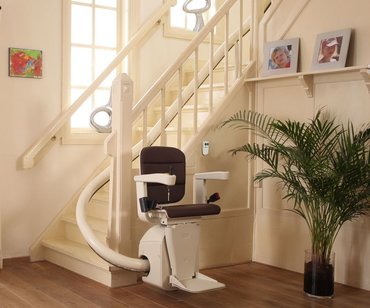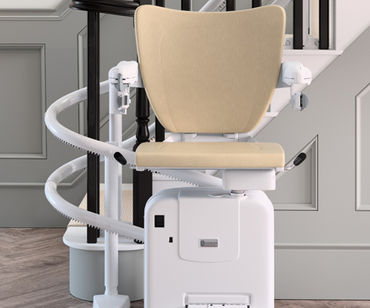
Depression and Loneliness- its importance in older adults
Some things are difficult to discuss with older generation, and as mental health moves away from the stigma that has been so long attached to it, we can see how vulnerable some of the older members of our community are. Often those with limited mobility, who are reliant on a home stair lift, struggle the most with loneliness and depression.
Who is the loneliest?
Loneliness comes in many forms, with temporary loneliness and long term loneliness as distinctly different. More people feel temporarily lonely, while long term loneliness can lead to severe repercussions to an individual’s health.
Loneliness is partly hereditary and partly environmental. This means some people are pre disposed to feeling lonely but also the circumstances in which we live and grow up in are a factor. Women are more likely to feel lonely, while those who live in a community feel less lonely as opposed to those in residential care.
Mobility has much to do with short and long term loneliness, as those with limited mobility struggle more to socialise and are more likely to rely on mobility aids such as a stair lift or mobility scooter. It also means they are more reliant on public transport which has strict timetables and can be unreliable and often lead people to staying at home rather than risk it.
The rate of loneliness is increasing as the population ages, and according to the research titled social relationships and mortality risk: a meta analytic review by Holt Lunstad J, Smith TB and Layton J B:
“Lonely or isolated older adults are at greater risk for all-cause mortality: a meta-analysis encompassing 148 longitudinal studies, with 308,849 participants followed for an average of 7.5 years, has reported that individuals with strong social ties have a 50% greater likelihood of survival compared with those who have poor social relationships and networks.”
According to Webmd, depression is not quite as prevalent as loneliness but a serious condition regardless: “Clinical depression in the elderly is common. That doesn't mean it's normal. Late-life depression affects about 6 million Americans ages 65 and older. But only 10% receive treatment for depression. The likely reason is that the elderly often display symptoms of depression differently. Depression in the elderly is also frequently confused with the effects of multiple illnesses and the medicines used to treat them.”
What are the negatives?
Loneliness and depression in later life can have some serious consequences to mental and physical health which have been extensively researched. In a paper ‘Social Relationships and Mortality Risk: a Meta Analytic Review’ by Holt Lunstad J, Smith TB and Layton J B, their research was summarised as follows:
“These findings indicate that the influence of social relationships on the risk of death are comparable with well-established risk factors for mortality such as smoking and alcohol consumption and exceed the influence of other risk factors such as physical inactivity and obesity.”
With consequences as serious as some of the most damaging habits, loneliness can no longer be ignored. Its effect on blood pressure has also been looked at in a paper ‘Loneliness predicts increased blood pressure: 5-year cross-lagged analyses in middle-aged and older adults’ written by Hawley LC, Thisted RA, Masi CM and Cacioppo JT with their findings below:
“In this study, we tested the hypothesis that the effect of loneliness accumulates to produce greater increases in systolic blood pressure (SBP) over a 4-year period than are observed in less lonely individuals. A population-based sample of 229 50- to 68-year-old White, Black, and Hispanic men and women in the Chicago Health, Aging, and Social Relations Study was tested annually for each of 5 consecutive years.”
Not only does loneliness affect your physical health, but your mental health is also at risk. Research has been done by Holwerda, T. J. Deeg, D., Beekman, A. van Tilburg, T.G., Stek, M.L., Jonker, C., and Schoevers, R and culminating in the paper ‘Feelings of loneliness, but not social isolation, predict dementia onset’ which found:
“Feeling lonely rather than being alone is associated with an increased risk of clinical dementia in later life and can be considered a major risk factor that, independently of vascular disease, depression and other confounding factors, deserves clinical attention. Feelings of loneliness may signal a prodromal stage of dementia. A better understanding of the background of feeling lonely may help us to identify vulnerable persons and develop interventions to improve outcome in older persons at risk of dementia.”
How do we overcome this?
Combatting loneliness in older adults is not a one size fits all experience. Every individual needs a different kind of support that must be offered. There are many befriending services on offer where volunteers can either visit an older person in their home (known as face-to-face befriending) or calls them on a regular basis (telephone befriending).
Contact the Elderly holds monthly sessions where a volunteer hosts a tea and talk afternoon. Other volunteers pick up the lonely and vulnerable, and take them to the venue, where a group meet for companionship. Though a different volunteer hosts each month, the same people attend and the same volunteers pick up the elderly from their homes in an effort to build trust and lasting friendships.
Day centres are a great resource who are always in need of volunteers and Friends of the Elderly help host coffee mornings, day centres and telephone befriending sessions. As an event that happens more regularly than once a month, this builds daily friendships that are important to those who feel loneliness and can often help combat early signs of depression.
The Royal Volunteer Service takes a more practical approach, looking to help the elderly with tasks they may struggle to do for themselves. From shopping to dog walking, there are many small services you can provide The Royal Volunteer Service allows for flexible hours to fit any busy lifestyle that still wants to give back to their community.
Image Credit: Olive428



